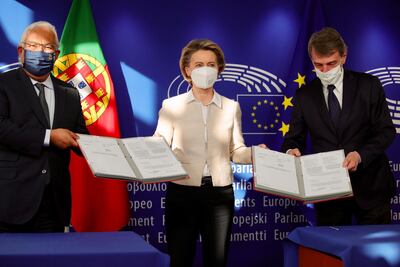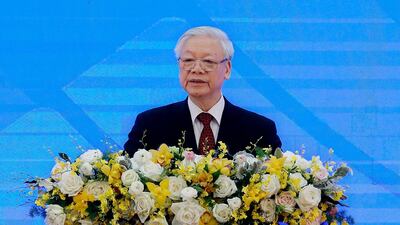The two most important and effective regional organisations in the world are, I would argue, the EU and the Association of South-East Asian Nations (Asean). With populations of 450 million and 650 million respectively, taken en bloc they would be the globe's second and fifth largest economies. While far less wealthy, Asean has been the driving force behind much of the Asia-Pacific's security and now economic architecture, from the East Asia Summit – usually attended by top leaders from 18 countries, including China, Russia and the US – to the recently signed Regional Comprehensive Economic Partnership, the world's biggest trade agreement.
But it is always the EU that gets not only the attention, but also the plaudits. The default position appears to be that its very existence is a noble endeavour. The EU was even awarded the Nobel Peace Prize in 2012 for having “contributed to the advancement of peace and reconciliation, democracy and human rights in Europe”. The implication has been that Asean was a bit second-rate by comparison; if it ever wanted to be considered a really successful regional grouping, it should emulate the EU and follow its example.
Today, however, never has that view looked more wrong. For the EU – and in particular the unelected Commission that calls itself the “executive arm” of the union – has so spectacularly failed to meet the needs of its peoples, while simultaneously overreaching itself, that serious questions are being asked about its future – including whether it has one at all.
The decision (later cancelled) by Commission president Ursula von der Leyen to raise a hard border on the island of Ireland, supposedly to stop supplies of Covid-19 vaccines leaving the EU for the UK, was just the latest instance of this behaviour. It not only incensed the British government, but also that in Dublin – an EU member state the Commission president could not be bothered to consult over an issue crucial to the peace process on the island.
The former Belgian prime minister Guy Verhofstadt called this a “diplomatic disaster”, and went on to accuse Ms von der Leyen of woefully mishandling the EU’s vaccine procurement process and “prolonging drastically the Covid pandemic on mainland Europe”. “A fiasco I called it and a fiasco it is,” he said.

But Ms von der Leyen is just following in a long line of EU officials who have been happy to act heavy-handedly at home, within the union, while floundering to match their grand pretensions to be a geopolitical player on the world stage.
The Commission’s vice president, Frans Timmermans – also unelected – has threatened to take Hungary’s democratically elected government to court over a domestic education issue, and openly attacked Poland’s government over another internal matter (reforms to its judiciary).
When the people of Greece voted conclusively against any more austerity in the 2015 election, the EU ignored the result and insisted on measures that would further impoverish ordinary Greeks before it would approve a bailout.
If internally the EU's problem is that it wields far too much power with next to no democratic mandate, its ambitions abroad are now an embarrassment. Earlier this month, the EU's High Representative for Foreign Affairs, Josep Borrell, made a trip to Moscow for "dialogue" on human rights and other matters. He was humiliated at a joint press conference with Russian foreign minister Sergey Lavrov, who dismissed the EU as an "unreliable partner" while leaving Mr Borrell to discover afterwards that Russia had expelled three EU diplomats during the time the two men were on stage. Concluded the Politico web magazine: "European foreign policy died in Moscow last week."
These are disasters that will never befall Asean. Its Secretary General would never dare to meddle in the 10 member states’ domestic matters, due to the cardinal principle of non-interference in each others’ affairs. It has left dealing with the pandemic to national health ministries, as several EU countries may now wish they had insisted on doing. Neither is Asean likely to try to take on much more of a foreign policy role than convener, in which it has been highly successful.
Asean will not overreach because, as the Malaysian academic Muthiah Alagappa wrote in a 2017 book marking the association’s 50th anniversary, it is “based on enhanced intergovernmental co-operation, not Europe-like supranationalism”. Constructing a “we” feeling is important, he continued, but Asean's fundamental basis is that “it is an association of sovereign member countries who desire to continue to be sovereign in most if not all matters.”
This is why Asean has been cautious in reacting to the coup in Myanmar. The statement issued by its current chair, Brunei, ended by saying: “we encourage the pursuance of dialogue, reconciliation and the return to normalcy in accordance with the will and interests of the people of Myanmar”. That, for Asean, was strongly worded, but expect no drastic action to follow.
If some deem this unsatisfactory, what this rests on is Asean’s recognition of the primacy of the nation state, and that building and maintaining one is a work never finished. The EU’s pursuit of “an ever closer union”, or the United States of Europe that Ms von der Leyen once said was her aim, seeks to make a country out of a continent – which is one reason it is stumbling so badly.
As Mr Alagappa wisely pointed out in “Asean Futureforward”: “Making legitimate nations and effective states may take centuries with no terminal point. Even after several decades and centuries, nation- and state-making may face challenges.”
It is true that Asean is sometimes criticised for doing too little, but its determination not to do too much is one reason for its longevity. Quietly, not asking for the limelight, Asean has established itself as a key interlocutor in the Asia Pacific and has contributed much to stability and rising prosperity in the region. There should be no “cultural cringe” towards a European institution that treats its member states with such arrogance. After all, which now – the EU or Asean – looks more likely to be around in 50 years’ time?
Sholto Byrnes is an East Asian affairs columnist for The National


